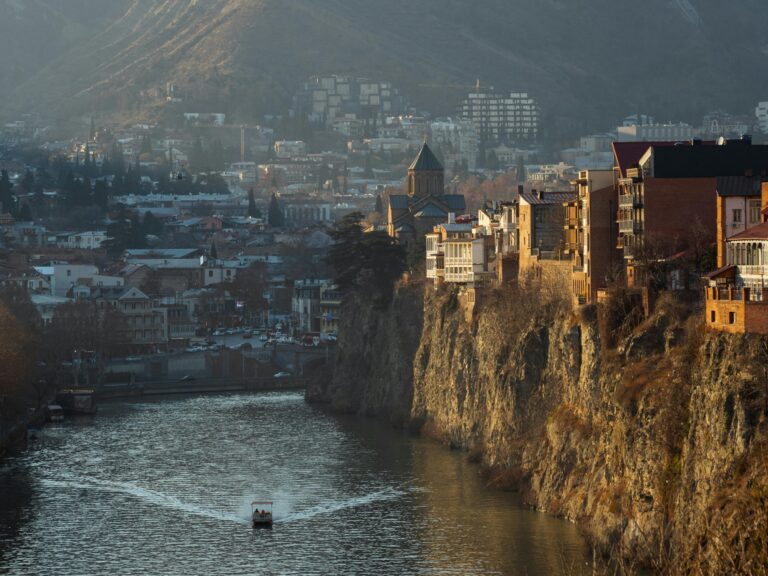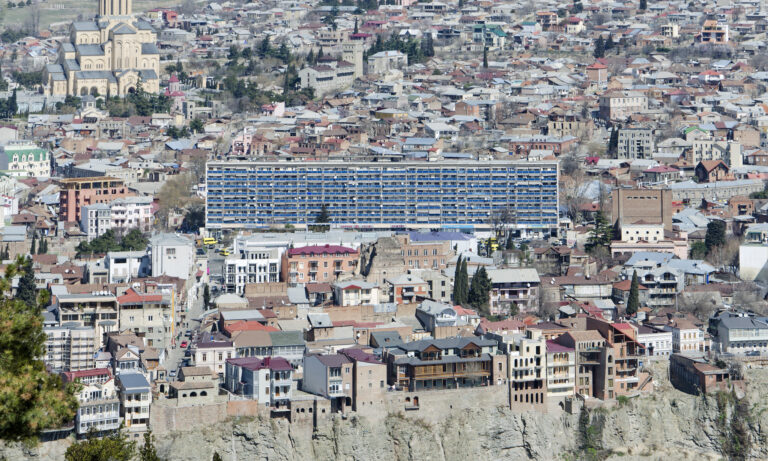
Georgia and China recently elevated their bilateral relations to a strategic partnership. While Georgia looks to boost its transit significance, cooperation might pose threats to the country’s democracy amid uncertainty over its future relations with the West.
From July 26 to August 1, 2023, Georgian Prime Minister, Irakli Gharibashvili, made an official visit to China to attend the opening ceremony of the 31st FISU World University Games. The Georgian leader was warmly welcomed by Chinese President, Xi Jinping, and subsequently, the two sides issued a joint statement on elevating their bilateral ties to a strategic partnership level. In the official document, Tbilisi and Beijing pledged to deepen policy coordination, align development plans, and expand cooperation in the political, economic, and cultural domains and in international affairs.
The recent pledge to intensify bilateral cooperation can be seen as a logical progression of the relationship as the ties between Beijing and Tbilisi have been rapidly evolving throughout the past decade within the framework of the Belt and Road Initiative (BRI). The Chinese initiative, which aims to boost connectivity between Europe and Asia, has complemented Georgia’s aspiration to become one of the major transit corridors between the two continents. Despite that, the new strategic partnership raises questions regarding the growing commitment between the two sides to enhance political ties and its possible impact on Georgia’s democracy and foreign policy orientation.
Growing Relations Based on Pragmatism
Diplomatic relations between China and Georgia were established three decades ago after Georgia gained independence from the Soviet Union. Initially, bilateral relations between the two countries remained modest as Beijing had little interest in the region. Until 2000, annual imports from China came to under $3 million, while Georgian exports to China remained below $1 million. This shifted drastically in the 2010s when trading volumes skyrocketed. This dramatic increase was primarily driven by the enormous growth in Chinese exports and underpinned by China’s shifting foreign policy.
From Beijing’s perspective, Georgia’s main asset is its strategic location, particularly its significance for China’s BRI. Located on the crossroads between Europe and Asia, Georgia could serve as a gateway for trade and transport between the continents. Seeing an opportunity, Georgia joined the initiative in 2016. As a result of growing interest from both sides, bilateral trade turnover grew significantly and a number of Chinese companies, such as Hualing Group, started to actively invest in infrastructure projects in Georgia. So far, over a dozen Chinese companies have secured large tenders to construct and reconstruct roads and railways in the country. One of the most significant investments in Georgia is a $1 billion highway with 96 bridges, and 53 tunnels, which cut the journey from the capital, Tbilisi, to the Black Sea coast in half.
In 2017, Georgia took significant steps to enhance its economic cooperation with Beijing by signing a Free Trade Agreement, making it the only country in the region with such an arrangement with China. Over time, Beijing’s presence expanded substantially, establishing itself as a major player in Georgia’s economic landscape. Georgian exports to China have seen solid growth and, currently, the Asian economy is Georgia’s third largest trade partner. In 2022, Georgian exports to China reached $737 million, while imports from China to Georgia were valued at over $1.25 billion.
A New Opportunity to Unblock Transit Potential
Georgia has enthusiastically embraced its newfound transit role and has openly tried to take advantage of it. Nevertheless, Georgia’s success in its efforts to become a transit hub has been limited due to a lack of infrastructure. Although Georgia is endowed with a 190-mile-long Black Sea coastline, it still does not possess a deepwater seaport, resulting in limited overall maritime capacity. This issue has hindered Tbilisi’s ambition to emerge as a major transit point in Eurasia.
The attempts to construct the first deepwater seaport in Georgia started in 2017 by the Anaklia Development Consortium (ADC), a joint venture between Georgian Group TBC Holding and US-based Conti International. Yet, the Ministry of Regional Development and Infrastructure of Georgia canceled the deal with the consortium for the construction of the port in 2020. The official reason invoked was non-compliance with financial accountability requirements. However, in a letter to the Georgian government, four US representatives stated that ADC was framed by the government, as the ruling party “hinders the investments of American companies.” As a result, up until now, no construction progress has been made and Georgia has been unable to capitalize fully on the potential.
The importance of the Anaklia deepwater seaport and Georgia’s transit importance has gained a new impetus amid geopolitical shifts resulting from Russia’s full-scale invasion of Ukraine. Moscow’s isolation from the West has made overland trade routes crossing Russia less attractive to international shippers, who have diverted cargo to the so-called Middle Corridor that links China to Europe via Central Asia, the South Caucasus, and the Black Sea. As a result, in 2023, Georgia leaped from 119th to 79th position in the World Bank’s Logistics Performance Index, which assesses countries’ ability to transit commodities across borders with speed and reliability. The improvement highlighted Georgia’s importance in international trade and cargo transportation.
In response, in December 2022, the Georgian government pointed out its intentions to revive the long-anticipated port project and emphasized that there had been some “positive developments,” including a call for expressions of interest in the port project for investment companies.
The significance of Georgia in the development of the Middle Corridor was also emphasized at the recent meeting between Prime Minister Gharibashvili and his Chinese counterpart, Li Qiang, in Beijing. Considering Beijing’s recent reiteration of the transit importance of Georgia and the upgrade in bilateral relations, there is a possibility that Chinese companies will soon invest in the Anaklia port construction. This could significantly upgrade the importance of the Middle Corridor and turn Georgia into a major transit point in Eurasia. There is a higher possibility that a Chinese company will take over the construction of the deepwater port since the Georgian government has been gradually distancing from the West amid the ongoing war in Ukraine. The cancellation of the previous contract could have been connected to the government’s fears that the US involvement in the construction of a port on the Black Sea that would undermine the importance of corridors passing through Russia could irritate Moscow. Thus, granting a tender to a Chinese company would seem to be a safer option.
Yet Another Step Away from the Democratic World?
While there is a need for Georgia to have closer economic ties with the second largest economy in the world, the apprehension about closer linkage with Beijing comes amid Tbilisi’s increasingly strained relations with the West and concessive policies towards Russia since the Ukraine war erupted. The domestic and international critics of the Georgian incumbent Georgian Dream party raise questions regarding the political facet of the strategic partnership and, more importantly, how it could impact the country’s democratic processes and its foreign policy. As Chinese economic engagement with smaller economies often leads to the spillover of Beijing’s political influence, Georgia’s willingness to expand cooperation on a political level is even more concerning.
The recently upgraded partnership can harm Georgia’s relations with the US, the country’s key strategic partner, and NATO, which considers China as one of the biggest geopolitical challenges along with Russia. In the document on strategic partnership, Tbilisi has expressed support for China’s global leadership initiatives, such as the Global Security Initiative, which serve as political mechanisms to contest the Western-led rules-based international order and decrease the influence of NATO.
For a NATO aspirant country, such as Georgia, deepening bilateral relations with Beijing could undermine the prospects to enter the Alliance. In this context, Prime Minister Gharibashvili’s recent absence at the Vilnius NATO Summit adds to perceptions about Tbilisi’s lack of clear interest in joining the Alliance, which has been a long-term strategic goal of the country.
Even though EU member states also have strategic partnerships with Beijing, the relations have significantly worsened due to human rights violations and China’s economic expansion. Italy has already decided to withdraw from BRI and Germany’s recently adopted strategy on China points to a “systemic rivalry” with the Asian power and a need to reduce risks of economic dependency.
Even though a number of agreed points in the Sino-Georgian strategic partnership seem to be ambiguous, they prepare the ground for China’s political influence that can further undermine Tbilisi’s relations with the EU and doom its candidacy for membership. Throughout recent years, the Georgian government has continuously demonstrated authoritarian tendencies, which became the major factor in failing to obtain the candidacy for EU membership in June 2022. In 2021, the Georgian government even turned down a low-interest $75 million EU aid and instead requested a loan from the China-led Asian Infrastructure Investment Bank (AIIB).
The Georgian government’s rapprochement with China might be driven by the interest to diversify external incentives to solidify its authoritarian policies and obtain more bargaining power in dealing with the West. Yet, even in this situation, the stakes remain high, and the ruling party cannot be sitting on two chairs. It needs to be aware of possible political repercussions in the long run both domestically and internationally and has to make sure that its domestic and foreign policies remain strongly aligned with Georgia’s long-term goals and values stipulated in the country’s constitution.
Written by
Ioseb Dzamukashvili Sekhniashvili
IossebIoseb Dzamukashvili Sekhniashvili is an Eurasian Studies specialist and a contributing Policy Analyst at the Georgian Foundation for Strategic and International Studies. His research focuses on democracy and security issues in the region.


